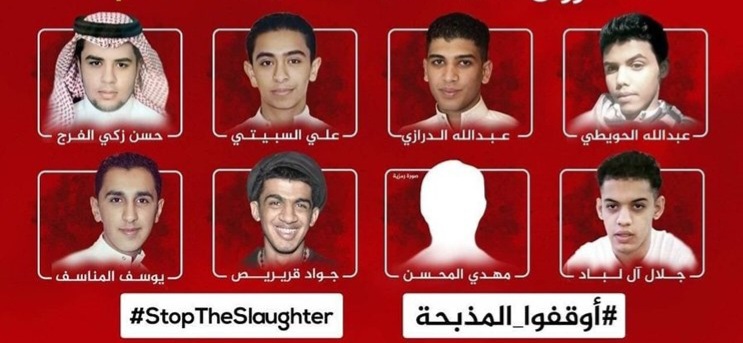Alwaght- Notorious as the world's main violator of human rights for extrajudicial executions, Saudi Arabia once again plans to execute eight Shiite teenagers. The west-backed monarchy issued death sentences for the youngsters without any conviction, according to reports. In response to the execution plans, hashtags reading ‘stop the massacre’ went trending by social media activists.
The European Saudi Organization for Human Rights (ESOHR) in recent days in a statement said that Saudi Arabia added 15 citizens to its execution list. With the new verdict, the number of those awaiting the sword execution in prisons would be 53, with eight of them being below 18.
The SaudiLeaks, a whistle-blower website with focus on Saudi Arabian home affairs, warned in a statement about deterioration of the rights situation. In a statement released by the website, there was a warning about the increasing pressures on the political prisoners and unfair sentences against them. It added that with some superficial and sham freedoms, the Saudi Crown Prince Mohammed bin Salman is seeking to distract the attention from the grave human rights conditions in the country.
The death sentence for juveniles under 18 is not permissible according to sharia and Islamic laws, and the death sentence is not executed for criminals until they reach the legal age. But the Saudi regime, contrary to its claims, does not commit to religious principles, and in recent years, it showed that it is not afraid to execute even the teenagers to eliminate the dissidents.
In addition to these 8 teenagers, a 13-year-old child has also been sentenced to death in the past days, triggering reactions from rights organizations. This child was 8 when he was arrested and now he is 13. With such anti-human rights actions that the Saudi regime has recorded in its black record, it has once again placed its name at the top of the list of human rights violators.
The mass executions, indiscriminate detentions, torture of the political activists and crackdown on the political activism, and freedom of speech are among the examples of the Saudi human rights violations.
Every year, Saudi Arabia executes hundreds of people who are mainly Shiites under false pretenses, and some of these people are executed en masse, and these are only a part of the crimes against humanity of the Saudi regime that find their way to media. Actually, the number of people who fall victim to the ambitions of the Riyadh authorities is much higher than this, and due to severe media censorship and a closed political atmosphere, many of these crimes are not given publicity.
The Saudi regime does not even hand over the bodies of many executed people to their families, and they are buried in unknown places by the government forces, and many families do not know where their victims are buried. Riyadh's crimes in mass executions are so rife that the UN and human rights organizations have repeatedly expressed concerns about this issue.
Since Crown Prince Mohammed bin Salman’s assumption of power in 2017, a large number of those sentenced to death has been teenagers. The Human Rights Watch (HRW) reported that the human rights conditions are horrible in the Arab kingdom and the international organizations have written to Saudi Arabia, telling it that such actions are a violation of the international laws. But Riyadh is indifferent to these warnings and adds to its crimes day by day.
The surprising point is that Saudi Arabia held the seat of the United Nations Human Rights Council while it massacred the Yemenis, killed the Saudi critic Jamal Khashoggi and dismembered his body with a saw, and executed people en masse.
Bin Salman's goal behind executing Shiite teenagers
Bin Salman, who has proven that he does not listen to any dissenting voice as he pursues his ambitions for power, has committed many crimes while in post as crown prince. The killing of thousands of Yemeni children and women, the killing of Jamal Khashoggi, and the execution of hundreds of opposition and Shiite leaders are most serious cases of his crimes.
Having in mind that Ukraine war and energy crisis have increased the West's need for Saudi energy and passivized its stances concerning the rights conditions in the Arab country, bin Salman has seized the opportunity and began to settle the score with the dissidents.
Also, to show that he is not afraid of tensions with the Biden administration and threats of the Congress, a despotic figure like Prince Mohammed embraces a policy of crackdown to tell the society that executions are a Saudi matter and the West cannot interfere in it.
The news of mass executions followed reports of Saudi Arabia buying stakes in Twitter after Elon Musk takeover of the social media platform, causing concerns in the Congress. Senator Chris Murphy, of Connecticut, on Monday called for a probe into the case. Many critics argue that the kingdom can now easily identify opposition activists online and detain or eliminate them.
Another issue is that by executing the Shiite teenagers, bin Salman intends to block prospects of any provocative actions by people of Qatif, the majority of whom are Shiites, and tell them that any actions will be met with a strong response. By executing Shiite teenagers and causing terror, Bin Salman intends to send a message to rebellious princes and his internal opponents that if they intend to rebel against him, his blade is sharp enough to cut their heads.
Under King Salman and his son, the trend of illegal executions of children expanded and according to figures, over 10 children were executed while there are no information about their proceedings and trial and a majority of them were victimized without charges. This inhuman cycle, many believe, will continue as long as the Wahhabis are in power in Saudi Arabia. The international conditions, at the same time, have paved the way for Al Saud to commit their crimes easily and publicly.



























